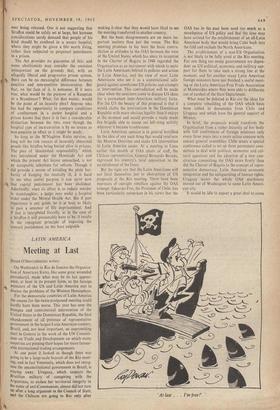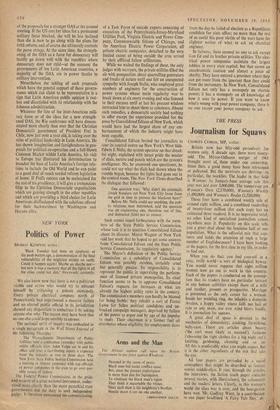LATIN AMERICA
Meeting at Last
HUGH 0.SHAUGHNESSY writes:
On Wednesday in Rio de Janeiro the Organisa- tion of American States, like some great wounded pterodactyl, made what may be its last appear- ance, at least in its present form, as the foreign ministers of the US and Latin America met to discuss the problems of the Western Hemisphere.
For the democratic countries of Latin America the omens for the twice-postponed meeting could hardly have been worse. This year has seen the brusque and controversial intervention of the United States in the Dominican Republic, the final abandonment of all pretence of representative government in the largest Latin American country, Brazil, and, not least important, an unpromising start in Geneva to the work of the UN Commis- sion on Trade and Development on which many Countries are pinning their hopes for more favour- able international trading arrangements.
At one point it, looked as though there was going to, be a large-scale boycott of the Rio meet- ing, and in fact Venezuela, which does not recog- nise the unconstitutional government in Brazil, is staying away. Uruguay, which suspects the Brazilian military of conspiring with the Argentinos, to violate her territorial integrity in the name of anti-Communism, almost did not turn up after a long argument in the Council of State, and the Chileans are going to Rio only after•
making it clear that they would have liked to see the meeting transferred to another country.
But the basic disagreements are on more . im- portant matters than just the venue. The Rio meeting promises to lay bare the basic contra- diction in attitudes to the OAS between the view of the United States, which has since its inception' in the Charter of Bogota in 1948 regarded the Organisation as an instrument with which to unite the Latin Americans behind its policies and action in Latin America, and the view of most Latin Americans who see it as a constitutional safe- guard against unwelcome US policies and attempts at intervention. This contradiction will be made clear when the ministers come to discuss US ideas for a permanent inter-American military force. For the US the beauty of this proposal is that it would clothe the intervention in the Dominican Republic with more obvious legality than it enjoys at the moment and would provide a ready made fire brigade able to stamp' out left-wing activity wherever it became troublesome.
Latin American opinion is in general horrified by the idea of any such thing that would reinforce the Monroe Doctrine and make US intervention in Latin America easier. At a meeting in Lima earlier this month of OAS chiefs of staff, the Chilean representative, General Bernardo Barada, eipressed his country's total opposition to the establishment of the force. • But the signs are that the Latin Americans will not limit themselves just to obstruction of US proposals at the Rio meeting. There have been murmurs of outright rebellion against the OAS concept. Eduardo Frei, the President of Chile, has been particularly outspoken in his views that the OAS has in the past been used too much as a mouthpiece of US policy and that the time may have arrived for the establishment of an all-Latin American body that would bring Cuba back into the fold and exclude the North Americans.
The establishment of a non-US Organisation is not likely to be fully aired at the Rio meeting. For one thing too many governments are depen- dent on US political, economic and military sup- port for them to take such a strong line at the moment, and for another many Latin American foreign ministers have just finished a useful meet- ing of the Latin American Free Trade Association at Montevideo where they were able to deliberate out of earshot of the State Department.
What must be debated in Rio are the ideas for a complete rebuilding of the OAS which have been tabled in documents from Chile and Uruguay and which have the general support of Mexico.
In brief, the proposals would transform the Organisation from a rather leisurely ad hoc body with full conferences of foreign ministers only every three years into a more active concern with annual general assemblies. Chile wants a special conference called to set up three permanent com- mittees to deal with political, economic and cul- tural questions and the adoption of a new con- stitution committing the OAS more firmly than did the Charter of Bogota to the concept of repre- sentative democracy, Latin American economic integration and the safeguarding of human rights. Uruguay wants the whole OAS machinery moved out of Washington to some Latin Ameri- can city.
It would be idle to expect a great deal to come of the proposals for a stronger OAS at the present meeting. If the US sees her ideas for a permanent military force blocked, she will be less inclined than she is now to go along with the plans for OAS reform, and of course she ultimately controls the purse strings. At the same time, the strength- ening of the OAS as a force for democracy will hardly go down well with the republics where democracy does not exist—at the moment the governments of ten Latin American countries, a majority of the OAS, are in power thanks to military intervention.
Nevertheless the tabling of such proposals which have the general support of those govern- ments which can claim to be representative is a sign that Latin American public opinion is rest- less and dissatisfied with its relationship with the Johnson administration.
Whatever the fate of the inter-American mili- tary force or of the ideas for a new strength- ened OAS, the Rio conference will have demon- strated more clearly than ever that the Christian Democratic government of President Frei in Chile, now just over a year old, is taking over the reins of political leadership in Latin America. He has shown imagination and farsightedness in pro- posals for political co-operation and a full-blown Common Market within Latin America, his visit to Europe has illustrated his determination to broaden the base of Latin America's foreign rela- tions to include the Old World and he can point to a good deal of much needed reform legislation at home. If Frei's success can be maintained for the rest of his presidency, it will give a tremendous fillip to the Christian Democratic organisations which are gaining strength in the other republics and which are providing a third choice for Latin Americans disillusioned with the solutions offered for their backwardness by Washington and Havana alike.



































 Previous page
Previous page